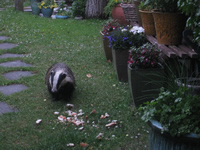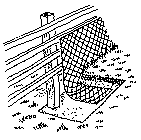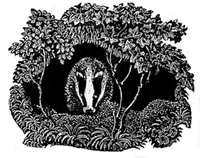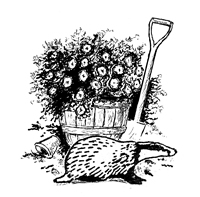You are here
Badgers In Your Garden
Advice from the Essex Badger Protection Group
Many people are delighted and welcome badgers when they choose to visit. Occasionally, though, they damage gardens, particularly lawns and plants, to the disappointment and annoyance of the gardener.
Unfortunately due to the amount of human development, particularly in urban areas, badgers are being squeezed into smaller habitable areas every year. This means they are having to roam further to forage and can damage fences and other boundaries in their determination to enter gardens.
Badgers and their homes (setts) are protected by law, but lawful actions can usually be taken to resolve, or at least minimise, problems without harm to badgers or other animals. These guidelines contain general practical advice and information which may help.
Why do badgers visit my garden?
Creatures of Habit
 Badgers are creatures of habit, living in a social group (or family) which occupies a territory. This territory may include your garden and depending on where you live could include many neighbouring gardens and other sites, or surrounding fields and woods if you live in the country. The size of badger territories can vary considerably, with each one providing for all the needs of its resident badgers. As urban areas expand, built-up areas get closer to where badgers are living. This can cause badgers to become disturbed due to the loss of their usual feeding grounds, resulting in them entering established gardens nearby which have not been troubled before. Also, as new gardens are established badgers visit them as they form part of their original territory.
Badgers are creatures of habit, living in a social group (or family) which occupies a territory. This territory may include your garden and depending on where you live could include many neighbouring gardens and other sites, or surrounding fields and woods if you live in the country. The size of badger territories can vary considerably, with each one providing for all the needs of its resident badgers. As urban areas expand, built-up areas get closer to where badgers are living. This can cause badgers to become disturbed due to the loss of their usual feeding grounds, resulting in them entering established gardens nearby which have not been troubled before. Also, as new gardens are established badgers visit them as they form part of their original territory.
Searching for Food
Almost invariably badgers will enter gardens in search of food. Badgers are normally nocturnal so garden visits are generally unseen during the night, unless the badgers’ sett is nearby when the animals may visit early in the evening. Badgers tend to follow the same routes when moving around their territory, so the entry point into your garden should be easy to find. Food placed for other animals and birds, particularly peanuts, will also attract badgers. To avoid this, food should only be placed in the garden during daylight and not left out overnight.
Sick or Injured
Occasionally an injured or sick badger may seek refuge in a garden or hide in an outbuilding or under a shed. Sometimes it can be seen during the day. If this happens, please contact our 24 hour helpline immediately.
What do badgers eat in my garden?
Badgers are omnivorous and will eat many things. They feed mainly on earthworms and insect larvae, which are often easy to find in lawns with short grass. However they are highly adaptable and, depending on the food available, will also take other invertebrates (such as beetles and bees), rodents (such as mice and voles), cereals, fruit and bulbs.
Quite often the seasonal availability of food will result in badger activity fluctuating with the time of year. The most obvious signs of badgers feeding are when they scrape out small pits in lawns to dig out insect larvae like cockchafer, cutworm and leatherjackets. Squirrels, woodpeckers, rooks and crows make similar holes. When badgers take earthworms there is often little trace however, as they suck them up like spaghetti!
In dry or frosty weather badgers are unable to get at their preferred earthworm and insect larvae food. Providing supplementary food and water at these times specifically for the badgers may distract them from eating other food available, such as your fruit and vegetables. However, food placement may encourage the badgers to visit more frequently, which could be counterproductive if they are causing problems. Also it may artificially support a larger population of badgers than that which would occur naturally. If you wish to feed badgers in your garden, they will readily eat peanuts, raisins, most soft fruits and bread. Sweet foods such as cakes, honey, jam and syrup are loved by badgers but can cause tooth decay and so should be given only as an occasional treat and then in very small quantities.
What else might badgers do in my garden?
Badgers could excavate a sett.
Badgers are large animals and can weigh more than 12 kilograms. A badger sett would therefore be quite obvious by the amount of earth removed during excavation. The Protection of Badgers Act 1992 makes it an offence to damage or destroy a badger sett or obstruct access to it (with up to a 12 month prison sentence and/or a £40,000 fine), so if you think you have a sett in your garden please contact us by email (info@ebpg.co.uk) for further advice including photographs of the area of concern and your exact address. This will allow us to check our database for badger activity in the area. With all of this information, your query will be passed to one of our local volunteers who should be able to provide you with some advice.
Please note: The Essex Badger Protection Group is run entirely by unpaid, part time, volunteers who all have extremely heavy caseloads. We will nevertheless aim to get back to you as soon as we can.
In some cases a licence can be obtained from Natural England, the government department which deals with wildlife licensing, to close part or all of a sett, but this is only granted under certain conditions and will require a qualified ecologist to complete the application and oversee the closure.
Occasionally badgers may dig a latrine in your garden.
A latrine is usually a small excavation about 150mm deep and about as wide, in which the badgers deposit their dung.
Badgers may collect bedding material
Badgers may collect grass, leaves or other plant material if your garden has an overgrown area with dense cover. The collection of bedding will leave an obvious trail as the badgers drag it backwards down into their setts or an above ground day nest. These nests will be used periodically when the badgers are moving around their territory.
How can I deter badgers from my garden?
It is not that unusual to hear of unexpected visits from badgers in the early spring as February is when most cubs are born. This drives two additional behaviours in badgers; one being that most mating activity occurs, causing badgers to move outside their usual territories looking for mates. Secondly, some badgers (usually the males) are driven away from their natal setts by the females raising cubs as they're keen to have more space. This often leads to new setts being created in areas not previously known to contain badgers. Often these ‘displaced’ badgers will return to their original sett later in the year once the cubs are self sufficient. It could therefore be that the problem resolves itself over time.
It is recommended that you always seek advice before taking any action. Essex Badger Protection Group has a lot of experience in dealing with problems caused by badgers and we will be able to provide advice free of charge. The legislation in place to protect badgers and their setts from persecution needs to be clearly understood to avoid well intentioned but illegal action. You could for example block up the place where badgers get into your garden, but if this prevented a badger from getting to or from its sett, it could be an offence.
However, generally, if you do not have a sett situated in your garden, there are several actions which could be considered before calling us.
Remove the Food Source
The most humane and long-term solution to discourage badgers from your garden is to remove or prevent access to what attracts them to the area. Only provide food for wild birds on bird tables or in feeders and if the problem persists try removing them completely. You should be aware that nutrients from birdseed can stay in the ground for a considerable time after feeders are removed, still attracting worms and grubs, and it could be a month or more before the badgers stop being attracted to the area. Additionally in dry weather, a freshly watered garden can also attract badgers as worms are brought to the surface by the moist ground. This can be a particular issue if you are watering your garden but your neighbours are not. We also suggest you clear away any windfall fruit and use expanding straps to securely seal dustbins to help to prevent badgers scavenging your scraps.
Physical Barriers
It is possible to construct a fence that will deter badger entry. Badgers are strong and persistent animals that can easily break through or dig under a weak or poorly constructed fence. They can climb well, and will squeeze through quite small gaps. Whilst erecting a substantial barrier may deter them from entry, if they are simply transversing your garden, leaving a gap in fencing to enable them to do this is maybe the easiest and cheapest option and will prevent constant damage to your fence repairs. If you have a dog you can fit a sliding door or similar over the holes during the day, only removing them at night when your own animals are safely indoors.
Barrier options include:-
 A strong wooden fence with heavy wire mesh attached and extended below ground, or a heavy wire mesh fence with the bottom extended below ground is recommended. The extension below ground will need to extend at least 600mm and have a horizontal return away from the garden of at least 300mm. The fence will need to be at least 1200mm high, and with wire mesh fencing an overhang of at least 300mm is recommended directed away from the garden.
A strong wooden fence with heavy wire mesh attached and extended below ground, or a heavy wire mesh fence with the bottom extended below ground is recommended. The extension below ground will need to extend at least 600mm and have a horizontal return away from the garden of at least 300mm. The fence will need to be at least 1200mm high, and with wire mesh fencing an overhang of at least 300mm is recommended directed away from the garden.
- A stone, brick or block wall with a suitable foundation dependant on soil structure is an alternative option. Such a wall should be at least 1200mm high with a smooth surface finish to deter climbing.
- Electric fencing, energised either by battery or transformed mains electric supply, can be an effective deterrent. It can be installed either temporarily or permanently, and can be used to protect the whole or a specific part of a garden. Mains electric supply fencing can also be controlled with a time clock which will automatically switch the current on in the evening and off in the morning. Permanent mains supply electric fencing using unobtrusive materials can provide a cost effective and lasting deterrent.
Chemical Deterrents
It is illegal to use substances like creosote, diesel oil, mothballs or bleach to deter badgers. There are currently no chemical deterrents that are specifically approved to deter badgers. Use of any chemical substances can be dangerous to children, domestic pets and other wild animals. There are claims that male human urine, human hair clippings or finely chopped Scotch bonnet chilli spread on the garden may act as a deterrent, but these methods have not been fully researched. Olbas oil and citronella may also deter badgers to some extent but need to be applied frequently as scent diminishes over time and in rain.
Ultrasonic Devices
These devices emit a fixed or variable signal which is inaudible to humans. These are available to purchase quite reasonably and there are several reports that in certain circumstances they have proved effective as badger deterrents, but conversely other reviews suggest they are not so effective. Should you wish to experiment with such a device then it is recommended that you check with the supplier, paying particular attention to the effect it may have on domestic pets.
Other Noise Deterrents
Other noise deterrents may help deter badgers as they have very sensitive hearing. Over time however they tend to have a limited effect since the animals get used to the annoying sensations. We suggest, therefore, that if you employ this method you regularly move them around the garden and/or frequently change the noises used. Examples of what you can use include wind chimes, a child’s windmill toy, some strips of tinfoil wrapped around a stick or even a radio left on all night (tuned to an all-night chat channel rather than music) at a very low volume that won’t offend neighbours.
Lighting
Security lighting may deter badgers in the short term, but they will soon become used to it so it will have a limited long term effect. Apparently some success has been had using solar powered ‘Red Eye Scarers’. These units have two flashing eyes that automatically start flashing from dusk to scare off nuisance wildlife.
Improving Lawn Condition
Badgers digging for insect larvae in lawns can cause significant damage. Improved aeration and drainage of a lawn will reduce the insect larvae in your lawn, as will the removal of moss and overhanging vegetation which both contribute to damp areas. Generally well drained and well aerated lawns are less attractive to insects as an egg laying site so that less larvae result. Therefore we would suggest spiking the lawn and applying ‘lawn sand’ to help. This will encourage deeper roots and minimise damage.
Are badgers a threat to me?
Badgers are afraid of humans as we are their only real predator. Normally a badger will disappear at the approach of a human and so will not present a threat. However, should you approach an injured or trapped badger it may attempt to attack in self-defence or in an attempt to gain freedom. In these circumstances leave the badger alone and contact us immediately on our 24 hour helpline. There are claims that badgers carry disease and will infect humans. This is only remotely possible if you were to be bitten by an infectious badger, or if for some reason you ingested faeces from such a badger. Anyone who accidentally touches badger dung or urine should, of course, wash his or her hands thoroughly.
Are badgers a threat to my pets?
It is very unlikely that badgers would represent any risk to your cat or dog. Indeed there are many reports of badgers and domestic pets interacting without problems. Provided they’re not backed into a corner with no means of escape, or injured and frightened, badgers are generally shy and will usually run away when confronted in a garden. They can be quite territorial between their own family groups though, and it’s not unusual to see them with quite severe looking bites and scratches on their backs and hind quarters caused by fighting amongst themselves. They’re nevertheless very robust animals and such injuries generally heal quite quickly without the need for any intervention or treatment.
Generally badgers avoid dogs unless they are harassed or cornered by them. It is best to keep your dog in overnight if it is likely to attack a badger. This will reduce the chance of it encountering a badger and getting into a fight that could harm either or both animals. Guinea pigs, rabbits and poultry should be housed securely at night. Attacks by badgers are very rare, but raids by foxes are not unusual.
What are the benefits of badgers in my garden?
Watching badgers in your garden foraging for food can give great pleasure and be educational for younger members of the family. The badgers will also remove some harmful creatures which may damage your crops, fruits or flowers. With consideration we should be able to all live in harmony.
Finally, if you feel that the voluntary work we do is worthwhile why not join us by clicking on this link Join Us?
Essex Badger Protection Group Hotline numbers: 07341 944567 or 07341 944568
eMail: info@ebpg.co.uk

Contact Us:
-
Tel: 07341 944567
or
07341 944568
-
eMail: info@ebpg.co.uk

Website by Souris Systems


